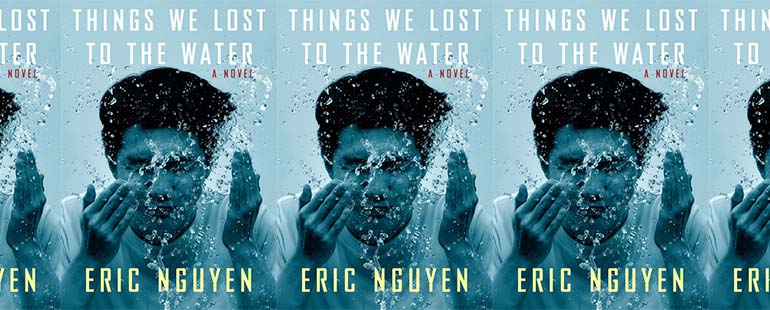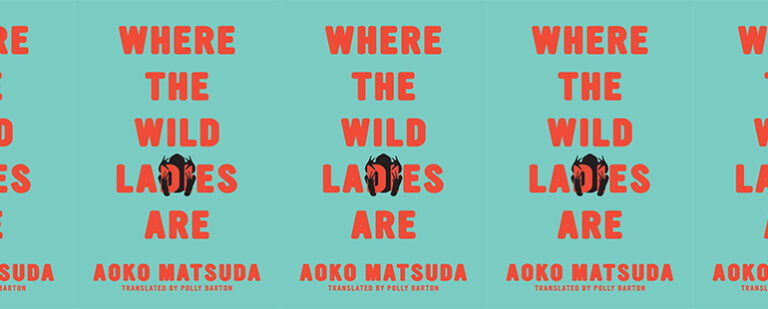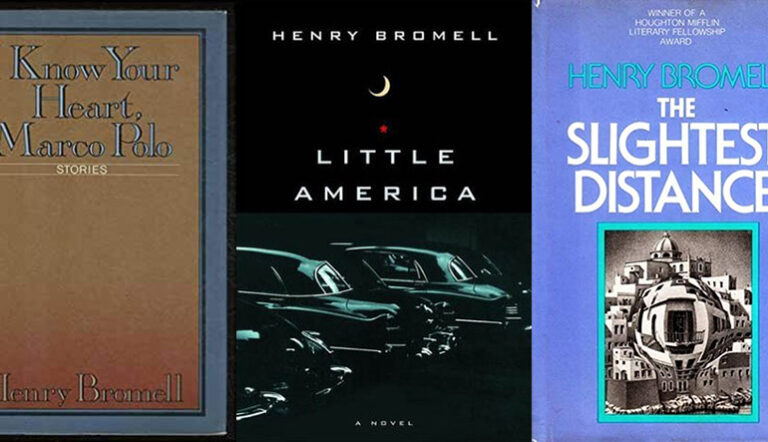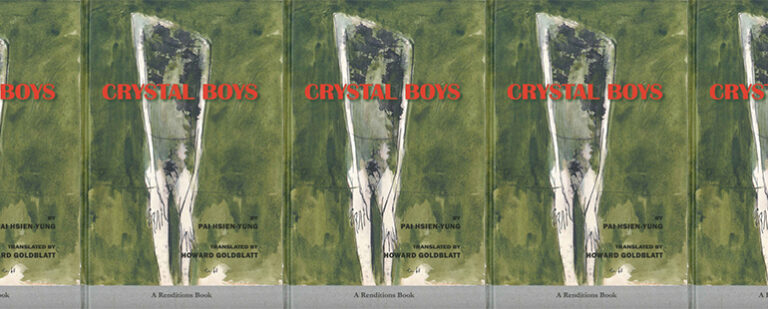Water, Stars, and Home in Things We Lost to the Water

In New Orleans this month, I went to a lecture given by Pulitzer Prize winning author and Ploughshares guest editor Viet Thanh Nguyen. He said, “All wars are fought twice: once in the battlefield, and once in memory.” The battle that Nguyen is talking about is one over whose story gets told, whose story gets mythologized, whose story lives on. What is a revolution? this battle asks. What and who was the revolution for? What is home?
When growing up in Miami, in a family of exiles, in a neighborhood of exiles, in a city of exiles, these battles are being played out on every corner, every day. But it’s hard to win a battle of memory when all your stories are censored back home, when all the storytellers have been murdered or thrown in jail. When the trauma is too much for those still living to properly talk about.
I have often written about inherited trauma, the idea that trauma can be inherited generations after a traumatic event physically happens, and how that affects exiles and refugees. But I don’t think that that’s the only thing the sons and daughters of exiles can inherit. I think even if a memory is lost, tracing your ancestor’s footsteps, or being in a similar climate, or looking at a similar setting, and enjoying the silence, you can get a little bit of the feeling of what was lost, of what was home, and that can be a battle that is won. It is why I feel so many refugees who are separated from their homes by seas and oceans and rivers, gravitate towards water, why so many of them look up at the stars and wonder about the stories we don’t know.
*
My father, just like mis abuelos before him, was exiled from Cuba. I was born in Miami, where just south, on a clear day, you can see Cuba from Key West. Only ninety miles of Florida Straits between them, ninety miles of sea. Cuba, the land mythologized based on the proximity and the distance, so many exiles never being allowed to return, so many hoops to jump through for the sons and daughters of exiles like me to jump through in order to go back home. When you look at my two homes from the sky, you can see year by year the encroachment of the water, the homes slowly getting swallowed by climate change. It is the same water that so many exiles try to cross to escape their dictatorship. The city of Miami, a purgatory for so many peoples who have been exiled, who are living as refugees, is filled with water. It is so humid that the water is in the air. Reading books like Eric Nguyen’s 2021 novel, Things We Lost to the Water, I think about how water can both separate you from and be your home.
In Things We Lost to the Water, Nguyen writes about a family of exiles from Vietnam. Hương leaves the country after Công, her husband and the father of their children, is tortured in a reeducation camp after the war. Hương and her two sons become refugees in New Orleans, making it over to the United States by boat. Throughout the novel, we follow the perspectives of Hương; her oldest son, Tuan; and her youngest son, Ben, who never got to meet his father. Throughout the novel, we see how prevalent water is in the family’s day-to-day lives, living in a neighborhood, Versailles, that floods often, living in a city that has hurricanes. To all of them, it is apparent that water and home are connected. And it is apparent to me too.
In the novel, we see how Hương, who planned the trip and who knows best the Vietnam on the other side of the water, who knows the father who still lives on the other side of the water, deals with being the mother, the only adult of the family, during their exile. Hương has fully made the leap of faith in making New Orleans their home, in living the “American Dream.” She wants her sons to live with her forever, and she wants to protect them from all the pains of exile, even going so far as to lie to them about their father being dead when he refuses to come over or respond to her letters. So when her neighborhood periodically floods, despite the trauma she has regarding the water, she worries more about the fishermen, saying, “We’re disappearing . . . the water keeps this place alive.” While she doesn’t say it, she has no home without the water. Water is home for her. As her sons move out and start living their own lives, Hương feels like she may be losing a bit of home; when, later in the story, she has to go back to Vietnam, the water looks different from how she remembered it, and so does Vietnam. She has lost her battle to keep her home.
I think of how my parents, Pops a child exile, my mother the oldest daughter of two Cuban exiles, both got to Miami for the last time as teenagers, and have never left, never moved away. How they’ve cemented themselves a home there. I think of how mi abuelo calls me just “American,” it sounding important to him, as if the statement proves they’d successfully beaten their exile, their refugee status, by my being completely “Americanized.” I think of how when we’d go to the beach as a family, we would all talk and laugh together, playing games in the water, of how Abuela, my sister, and my Mom would leave the water first. How Abuelo, Pops, and I would wait, and how the conversations would grow quiet, and how we’d all just float, letting ourselves go deeper into the water, deeper into what both surrounds and is our home.
I think of how in each of my homes, after the heat waves and rainstorms that threaten Miami, threaten New Orleans, the water keeps encroaching on our homes. While politicians on the state level, federal level, and globally take their time, these places don’t have that time, with king tides bringing floods to Miami, with New Orleans flooding and losing power after normal summer rainstorms.
*
Tuan’s arc with home and the water goes a little different. He was just a child when he and his mother and brother were exiled from Vietnam to the United States. Early on, he misses Vietnam deeply, dearly. When he and his mom have a bad day, she tells him how they need to go home, referring to their apartment in New Orleans East. Tuan doesn’t feel that New Orleans is home, and he says, “Home is far away.” Tuan can’t even fathom the idea of New Orleans becoming his home, or the idea of what they’ve lost on the other side of the water.
When Tuan is a little older, his mother takes him and Ben to the beach. It is here where Hương tells her sons that their father is dead, and it is this moment when Tuan loses his home, his complete family, Vietnam; it is this moment when he loses home as the idea of permanence and security. The fact that the beach, the proximity to the water, echoes their exile from Vietnam only angers Tuan further. The water will always be the struggle for them.
Reading this, I think of how my father used to go to sleep to the sound of the waves crashing against El Malecon every night back in Cuba. I think of how he still loves that sound, but how every time he goes to the beach, he thinks about how the beaches in Cuba were just a little better. How so many people feel that, even the sweetest of things being a little tainted by what was lost. I think of how I always loved the beach so much as a kid. I think of how I’d float and hear the waves coming, and think it was the pulse of the ocean. I think of how nowadays, on a cold night at the beach in the winter, when the breeze hits just right, it reminds me of all the exiles and refugees who have died trying to raft to the United States from Cuba. I think of how every time I float in the water now, I don’t only wonder if it is the pulse of the sea, but the pulse of my and everyone’s loved ones. If it’s the closest we can get to being with them physically on this earth.
*
Ben has a different relationship with the water, as he doesn’t remember Vietnam or his father. You can see the distance between him and the homes that Tuan and Hương knew. This is shown even in how he prefers his Americanized name.
Ben doesn’t connect the sea with the trauma, but with the mythology he knows, with the mythology he’s heard about all his life. So Ben connects less with the ideas of the sea than with the stories of sailors and their use of the stars. At one point, he even compares his mother’s trip to a reverse of the story of Penelope and Ulysses. Ben often thinks about how he read that sailors “used to look at the stars to find their way back home or whatever their destination was.” When Ben has a heartbreaking love story in the middle of the novel, he thinks about how stars “were once used to tell the future, like the words to a story written in dots, holding everyone’s fate. How he wanted to run his fingers across those stars and read what they said, every single word, every piece of light.”
This is what draws Ben to traveling, to using the stars, or any bit of light he sees, to guide his travel. Having heard about his father’s love for French literature, he wonders if he has read any of the same books, and he goes to France, to see if by living out a dream of his father’s, he could get closer to him, closer to understanding the ghost of a father he had.
Ben doesn’t have the experiences, knowledge, or memories that Hương or Tuan have, but that empty space feeds his curiosity to know more about his father; he says he only has “echoes of would haves, could haves . . . not a real life father but a ghost of a father, an afterimage of a father.” So he hopes that by following one of his father’s passions, he can flesh out the ghost a bit more.
The first time I went to Cuba, I was often asked why would I want to go back. The gringos would all ask what beaches and touristy things I was going to do, like how the Austrian roommate of Ben always wanted him to go out partying in the City of Light. What was left for me there? I always remember thinking about sitting on El Malecon and just staring out at the sea, and feeling a meditative calm, thinking of how often Pops and mis abuelos and so many other Cuban refugees and exiles have done the same. I think of how my first night away from Miami, I looked at the stars, and I asked my father if he saw the same stars I had. I think of how my father always looks at the stars, saying how he will “look at the sky and feel transported to younger days . . . I think I trigger some past memories. I wish I knew and I would do it more often.”
At the end of Things We Lost to the Water, each of the characters has to go through the water, go through the storm, to get a better understanding of their home, the physical spaces they call and called home, and the family that is their home. For so many of us who are exiles or the sons and daughters of exiles, that understanding, that inheritance we can tap into when by the water, when looking up at the stars, is our way of winning an important battle, of healing from the traumas we have inherited from our ancestors and elders. So I see how by sitting outside, by the water that surrounds us, is us, and threatens to overtake us one day soon, under the stars that tell us stories, that transport us, we have made a home. It is important to make peace with these stars, stories, and water, and to make time to spend with them. It is important to see the water reflect not just the sky and stars above, nor the past, but a brighter future too, to tap into our collective memory, and to win that battle, for us, for our parents and ancestors, and for the generations to come.


